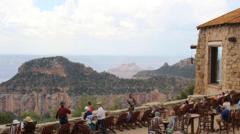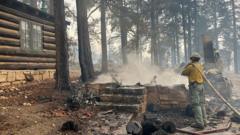Both Canada and the northern United States face air quality alerts due to smoke from rampant wildfires, leading officials to caution residents on outdoor activities. Thousands have been displaced, and politicians have raised concerns over the impact of smoke on the summer experience.
Air Quality Alerts Issued Amid Ongoing Wildfires in Canada and the US

Air Quality Alerts Issued Amid Ongoing Wildfires in Canada and the US
Smoke from wildfires prompts health advisories across regions, with officials urging limited outdoor exposure.
Air quality alerts are now in effect across Canada and northern states in the United States, spurred by smoke emanating from extensive wildfires. Health officials are urging residents to minimize outdoor activities as wildfire smoke has drastically affected air quality.
Environment Canada has issued warnings for much of Ontario, where Toronto experienced some of the worst air quality globally on Monday. In the United States, Chicago is under a similar advisory that will last through Tuesday evening, with specific recommendations for vulnerable populations including infants and the elderly.
Prime Minister Mark Carney is set to engage with emergency responders in Ottawa to evaluate the ongoing crisis, as wildfires in Manitoba, Saskatchewan, and northern Ontario have obligated the evacuations of thousands. Environment Canada stressed the importance of limiting outdoor time, especially for at-risk groups such as the elderly, pregnant individuals, infants, and anyone with pre-existing health conditions.
In Chicago, the National Weather Service issued a statement via social media, highlighting the continued presence of unhealthy ozone levels compounded by the impacts of wildfire smoke. This situation has also led to political exchanges, with six members of the U.S. Congress conveying complaints to Canada’s ambassador regarding the smoke's interference with summer activities.
In response, the premier of Manitoba criticized these lawmakers for downplaying the severity of the wildfires. The situation continues to escalate, with fires consuming vast areas, especially in western Canada, where approximately 30,000 individuals were forced to evacuate earlier this season due to emergencies declared in Saskatchewan and Manitoba.
In Newfoundland, a blaze ignited on the Bonavista peninsula continues to expand, devastating several cabins overnight. Climate scientists consistently attribute the worsening wildfire seasons to climate change, noting that Canada is heating at an alarming rate, almost double that of the global average.



















